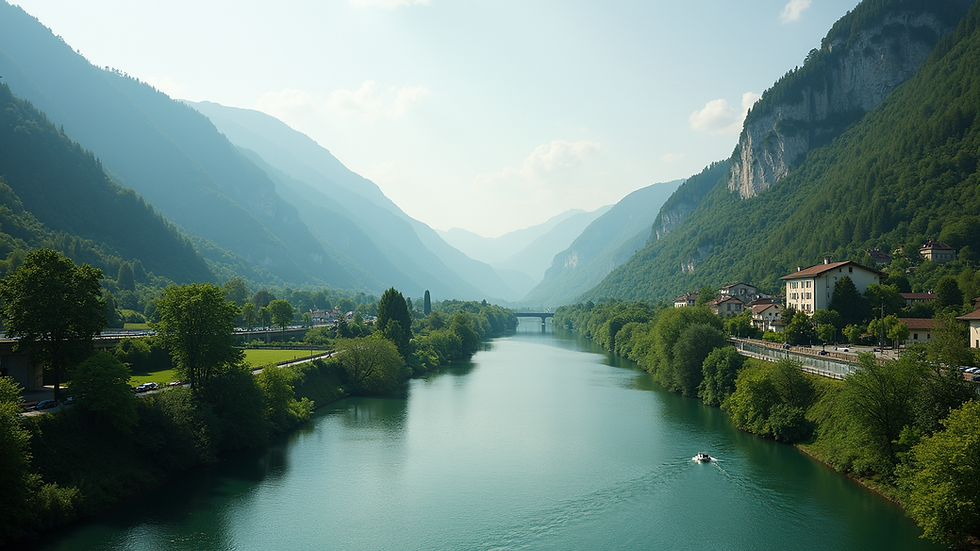Exploring Europe Aboard a River Cruise Unveiling the Journey’s Unique Advantages
- Brad Kaplan
- Jun 18, 2025
- 4 min read
Europe is a dream destination for many, with its rich history, diverse cultures, and breathtaking landscapes. However, planning a trip can often feel overwhelming. Picture navigating crowded train stations, constantly packing and unpacking, and figuring out where to go next. But what if there was a simpler way to experience the heart of Europe while enjoying comfort and charm? Enter the European river cruise.
River cruises offer a unique experience that has grown in popularity. They provide a "floating boutique hotel" experience that merges convenience with immersive exploration. Let’s examine why a European river cruise could be your ideal getaway, how it compares financially to other European trips, and what sets it apart from traditional land-based tours.
The Undeniable Advantages of a European River Cruise
Imagine waking up every day to a stunning view outside your window, without ever having to pack your bags again until the end of your journey. That is the beauty of river cruising.
Unpack Once, See Many
One of the major benefits of a river cruise is the ease of travel. You unpack once and settle into your cabin, which serves as your home base for the entire journey. No more lugging heavy bags through busy airports or train stations. For example, on a typical seven-night cruise along the Danube, you can visit up to five countries while only unpacking one time.
Intimate and Relaxed Atmosphere
River cruise ships are much smaller than ocean liners, usually carrying between 100 to 200 passengers. This smaller size fosters a more personable atmosphere. You have a greater chance of getting to know fellow travelers and forming friendships. Many travelers report that the communal dining settings and group excursions create a welcoming community feel.
Dock in the Heart of Cities
River cruise ships can navigate narrow waterways, allowing them to dock right in the city center. This means you can step off the boat and begin your adventure without wasting time on long transfers. For instance, docking in cities like Vienna or Strasbourg puts you within walking distance of major attractions, making it easy to explore local sights.
Constantly Changing Scenery
A river cruise offers beautiful, ever-changing landscapes as you sail from destination to destination. Each day brings new scenes of rolling hills, quaint villages, and historic castles. Imagine gliding past the fairy-tale St. George’s Castle on the banks of the Rhine while enjoying breakfast on deck.
Guided Excursions and Cultural Immersion
Many river cruises include guided excursions led by knowledgeable local guides. For example, in Amsterdam, you might join a guided bike tour of the city’s canals and historic sites. These guides share fascinating stories and hidden gems that standard guidebooks often overlook, enriching your experience.
The Cost Comparison: River Cruise vs. Traditional Travel
Budgeting is crucial when planning a European vacation. While a river cruise may initially seem more expensive than a land-based holiday, its all-inclusive nature explains the value.
When you factor in costs for accommodation, transportation, meals, and excursions, river cruises often come out ahead. Many packages include:
Meals (typically breakfast, lunch, and dinner)
Local beverages
Guided excursions
This enables travelers to enjoy their journey without worrying about unexpected costs. Studies show that travelers often spend 20% to 30% less on a river cruise compared to a typical land trip when considering additional expenses.
Flexibility with Itineraries
Unlike traditional tours that may tie you to fixed schedules, river cruising allows for some flexibility. Many cruise lines offer optional excursions or free time for exploration in port cities, enabling you to tailor the experience to your preferences. Whether you want to join a wine-tasting tour in Bordeaux or take a leisurely stroll through Prague, options abound.
Key Differences from Traditional Land-Based Tours
Understanding the unique features of river cruising reveals why it can be an appealing choice for travelers.
Less Time Spent Traveling
A river cruise minimizes travel-related disruptions. Most travel occurs while you sleep, so you can maximize your exploration time during the day. In contrast, land-based tours often involve lengthy bus rides or train trips that cut into your sightseeing opportunities.
Onboard Activities and Amenities
River cruise ships offer various onboard activities, such as cooking classes, fitness programs, and entertainment. For instance, a river cruise along the Seine might feature a French cooking workshop where you can learn to prepare local dishes, enhancing both your culinary and cultural understanding.
Culinary Excellence
Culinary experiences on river cruises are often a highlight. Many cruise lines collaborate with renowned chefs to provide meals featuring locally sourced ingredients. You might enjoy freshly prepared coq au vin while sailing through the vineyards of Burgundy, or indulge in a classic schnitzel during a port stop in Vienna. Dining becomes an unforgettable part of your journey.
A Cozy Atmosphere
The intimate nature of river cruises fosters a cozy ambiance. With fewer guests onboard, the staff can deliver personalized service, enhancing your overall experience. Passengers often share stories with the crew and quickly become familiar with their names, creating a home-like feel that sets these cruises apart.
Setting Sail for Adventure
As you plan your next getaway, consider the unique benefits of a European river cruise. With seamless travel, a welcoming atmosphere, authentic cultural experiences, and unmatched comfort, this mode of exploration stands out.
Why not embark on a journey filled with mesmerizing landscapes and unforgettable experiences? Each morning, when you gaze out your window to find another charming town ready to be explored, you'll know you've made a remarkable choice.





Comments